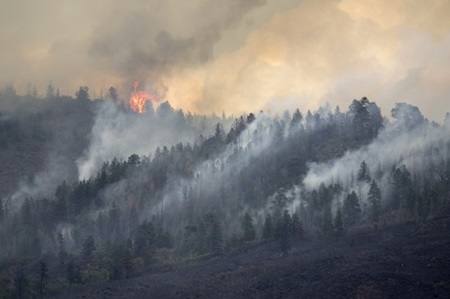 Our beautiful state of Colorado is no stranger to wildfires, and while most occur in remote areas, fire season—which typically lasts from May through September—can see smoke spreading far and wide across the state. Wildfire smoke contains fine particulate matter that can be hazardous to health when inhaled, causing respiratory or cardiovascular health problems.
Our beautiful state of Colorado is no stranger to wildfires, and while most occur in remote areas, fire season—which typically lasts from May through September—can see smoke spreading far and wide across the state. Wildfire smoke contains fine particulate matter that can be hazardous to health when inhaled, causing respiratory or cardiovascular health problems.
When outdoor air quality suffers from wildfire events, it’s especially important for building owners and managers to ensure they are providing clean indoor air for their occupants. Improving indoor air quality with commercial HVAC in wildfire season ensures people can access safe, clean air and maintain their health and well-being.
Answering Your Questions About Commercial HVAC In Wildfire Season
Wildfire smoke places pollutants into the air that are more challenging to filter out than most common pollutants or irritants. Compared to normal dust or pollen, wildfire smoke contains fine particulates that can pass through many standard filters.
A modern and well-maintained commercial HVAC system deploys a wide range of capabilities to reduce indoor air pollution from wildfire smoke, including:
- Air exchange control, which minimizes the amount of outdoor air entering the building to reduce the infiltration of smoke and can also increase the rate of air exchange as needed
- Air quality sensors and smart controls that automatically adjust the system’s settings based on the quality of indoor and outdoor air
- Integrated air purification systems with HEPA filters
Combined with adequate sealing and insulation in your building and regular maintenance and monitoring, modern commercial HVAC systems can effectively keep your occupants healthy and well during wildfire season.
Does central air help with wildfire smoke?
Central air can capture much of the particulate matter and pollutants from smoke that enter your building during wildfire season. However, central air’s ability to capture these pollutants depends heavily on your infrastructure’s filtration capabilities.
Without properly maintained or effective filtration solutions in place, central air will simply spread the particulates and pollutants it draws in from outside throughout your building, exposing faculty, employees, and visitors to allergens and irritants.
If your HVAC system uses high-efficiency particulate air (HEPA) filters or filters with a Minimum Efficiency Reporting Value (MERV) rating of 13 or higher, it can adequately capture many of the small particulates found in wildfire smoke before they end up in your building’s air circulation system—and your occupants’ lungs.
Do air conditioners filter smoke from wildfires?
Your building’s air conditioner alone may be able to filter smoke from wildfires to some degree. However, whereas HVAC systems can accommodate an extremely wide range of appropriate filtration and ventilation solutions to capture the extremely fine particulate matter from wildfire smoke, not all air conditioners on their own have the necessary filters to effectively maintain indoor air quality.
If your building relies primarily on air conditioners in the summer for climate control and ventilation, you should ensure that your AC system can adequately filter out airborne particulates during wildfire season. To assess your existing AC setup for efficacy, contact your local commercial HVAC professionals for advice.
10 Tips for Maintaining Air Quality with Commercial HVAC in Wildfire Season
Using commercial HVAC in wildfire season to improve indoor air quality is essential to protecting and maintaining the health of your occupants. Here are ten things you can do now to make sure your HVAC system is up to the task this summer:
- Upgrade your HVAC filters to HEPA and MERV 13 filters and regularly change them as needed
- Make adjustments to run the fan continuously to keep air moving through the filters during periods of poor air quality
- Check for and seal leaks around windows, doors, and HVAC ductwork to prevent smoke from entering
- Reduce the amount of outdoor air being brought in by the HVAC system to minimize the introduction of smoke particles
- Supplement your HVAC system with portable air purifiers equipped with HEPA filters in high-traffic areas
- Keep indoor humidity levels between 30% and 50%
- Perform regular maintenance on the HVAC system, including checking and replacing filters as needed
- Use indoor air quality (IAQ) monitors to track levels of particulate matter and other pollutants and adjust your HVAC in real time based on indoor air conditions
- Inform tenants or employees about steps being taken to improve air quality and about personal measures they can take to maintain good air quality
- Work with professionals to assess your current capabilities and explore upgrades or adjustments to your commercial HVAC that could enhance its performance ahead of wildfire season
Now you know how to keep indoor air clean during wildfires—but knowing is only half the battle.
To make sure your HVAC system is prepared for whatever this year’s wildfire season blows its way, get in touch with the commercial and industrial HVAC experts at Chiller Systems Service today. Our years of experience in the Metro Denver area mean we’re prepared to help businesses across the Colorado Front Range do their part to keep their occupants safe and healthy during wildfire events.

